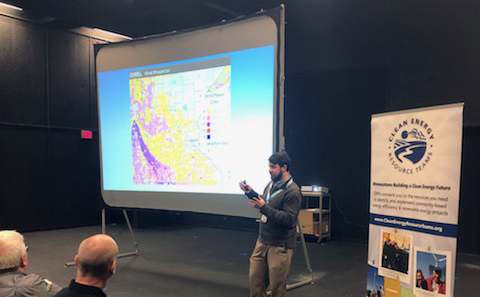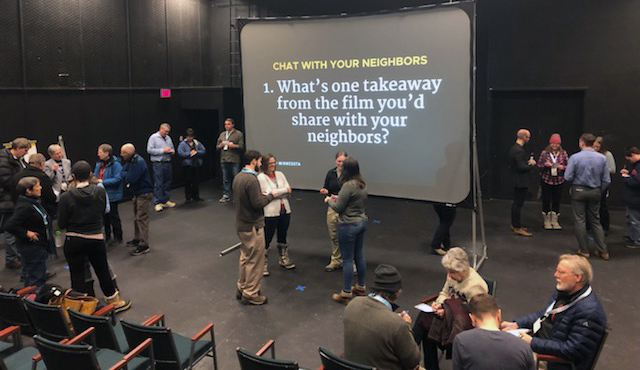A growing network of landowners, local government officials, educators and businesses are at the heart of Minnesota’s bustling clean energy industry, which produced about 25% of the state’s electricity last year. The industry has created 59,000 clean energy jobs statewide, while also supporting farmers and generating property tax revenues that fund community projects.
The Power of Minnesota, a new documentary, is making its way around local festivals and screenings highlighting the stories of the unique Minnesotans at the center of the clean energy economy. But the momentum doesn’t stop at the end of film–the documentary is serving as an exciting launching off point for community conversations, where Minnesotans gather to discuss the future of clean energy in their towns.
In early February the Power of Minnesota screened at the annual Frozen River Film Festival in Winona, which typically showcases films exploring environmental issues, sustainable communities, adventure travel and sports, and diverse cultures. There to introduce the film, Briana Baker of Minnesota Interfaith Power & Light (and documentary narrator) outlined how individuals and communities can get involved in clean energy. After the film screening, attendees heard from the City of Winona’s first-ever Natural Resource Sustainability Coordinator, John Howard, about exciting local energy projects.
Following the presentations, event partners from Clean Energy Resource Teams (CERTs), the Institute for Agriculture & Trade Policy (IATP), and the Jefferson Center facilitated a shortened Citizens Jury-style small group discussion after the film to explore key information about energy, ideas for energy action, and energy questions the community is curious about.

FIRST, THE GROUP IDENTIFIED KEY INFORMATION THAT THEIR NEIGHBORS SHOULD KNOW ABOUT ENERGY:
- Renewable energy is a rational, local, and key part of Minnesota’s economy.
- Locally grown renewable energy offers the following economic benefits:
- Local tax revenue for townships and counties
- Construction and maintenance jobs
- Renewable energy offers environmental benefits in comparison with other types of energy.
- Efficiency improvements like energy audits and other conservation measures play a large role in energy future.
NEXT UP, THEY DISCUSSED ACTIONS THE COMMUNITY COULD TAKE TO ACCOMPLISH CLEAN ENERGY GOALS, LIKE:
- Increase adoption of solar (on-home and community gardens)
- Nonprofit community solar garden project with trustworthy developer
- Focus on low-income/rental households by offering incentives
- Establish local incentives for solar, wind, and energy efficiency
- Incentivize energy audits for all buildings in the county
FINALLY, THEY CREATED A LIST OF QUESTIONS AND IDEAS FOR LOCAL EVENT PARTNERS AND THE CITY OF WINONA’S PARTNERS IN ENERGY TEAM TO EXPLORE, SUCH AS:
- Can utilities provide on-bill financing for rooftop solar panels?
- How to get businesses involved in energy efficiency and renewable energy?
- What are some inclusive opportunities for clean energy that address the intersection of class & race?
The community members who braved the Minnesota cold on a Saturday night were representative of the area’s residents overall: engaged, passionate, and ready to take action. “Winona is undertaking innovative and ambitious clean energy actions, setting an example for communities across Minnesota,” said Tara Ritter (IATP). After the deliberations concluded, a few participants also won energy-related prizes, including a home energy visit, LED light bulbs and honey made from pollinator-friendly solar gardens.
“There are easy things people can do in their own homes, businesses, and schools to save energy and tap into renewable energy,” said Chris Meyer with the Clean Energy Resource Teams. “We’re excited to help folks take those actions and to make connections to what’s happening in Winona, our region, and across Minnesota.”
The ideas and prompts generated at the event will help to guide the activities and outreach for the Winona Energy Action Team and Sustain Winona in 2019.
Winona County Leads on Energy
Last year, the City of Winona partnered with Xcel Energy to reach out to local businesses and discuss how they could reduce their energy usage while saving on their bills. And last winter, we worked with Xcel Energy Partners in Energy, Sustain Winona, the Winona Housing & Redevelopment Authority (HRA), and Semcac, a local Community Action Agency to expand access to energy efficiency improvements for households across Winona County. In 2017, 197 Winona County households received Low Income Home Energy Squad visits, up from only 12 conducted in 2016. The City of Winona is continuing to incorporate Xcel program and rebate information into their home rehabilitation efforts, creating greater savings (for both energy and energy bills) for area households.
In May 2018, we convened the Winona County Energy Dialogue, which included 13 participants representing the public, while 6 participants represented local officials and others involved in local energy issues. Over 2 days, they listened to experts discuss the local energy system, considered energy challenges and opportunities, and made plans for action. The Winona County Energy Dialogue and the Frozen River Film Festival discussion are part of the Rural Dialogues, which use community discussions and deliberation to build a strong, vibrant, and resilient future for rural communities.
The Jefferson Center and IATP are bringing community members together across Greater Minnesota to learn, deliberate and act around the basics of the local energy system, discuss energy goals, and brainstorm ways to achieve their goals. Learn more and connect with us at ruraldialogues.org.



